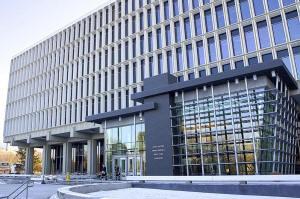Idaho doctor, patients sue over new law halting public benefits to
immigrants in US unlawfully
[June 27, 2025]
By REBECCA BOONE
BOISE, Idaho (AP) — An Idaho doctor and four residents are challenging a
new state law that halts some of the few public benefits available to
people living in the U.S. unlawfully, including a program that provides
access to life-saving HIV and AIDS medication for low income patients.
The ACLU of Idaho filed the federal lawsuit Thursday night on behalf of
Dr. Abby Davids and four people with HIV who are not named because they
are immigrants without lawful permanent residency.
The complaint says the new law is vague, contradicts federal law and
makes it impossible for health care providers to determine exactly what
kind of immigration status is excluded and how to verify that status for
patients. They want a judge to grant them class-action status, expanding
any ruling to other impacted people.
Dozens of patients treated by one Boise-area clinic stand to lose access
to HIV and AIDS medication under the law, according to the complaint,
including several cared for by Davids.
“Withdrawing HIV treatment from her patients will not only have
devastating consequences on their health, it raises the public health
risk of increased HIV transmission,” the ACLU wrote in the lawsuit.
“When her patients are undetectable, they cannot transmit the virus.
Without HIV treatment, however, they cannot maintain an undetectable
viral level and therefore are able to transmit the virus to others.”
The new Idaho law takes effect July 1, and appears to be the first
limiting public health benefits since President Donald Trump ordered
federal agencies to enhance eligibility verification and ensure that
public benefits aren't going to ineligible immigrants.

The law requires people to verify that they are legal U.S. residents to
receive public benefits like communicable disease testing, vaccinations,
prenatal and postnatal care for women, crisis counseling, some food
assistance for children and even access to food banks or soup kitchens
that rely on public funding.
Federal law generally prohibits immigrants in the U.S. illegally from
receiving taxpayer-funded benefits like Medicare, Medicaid, Temporary
Assistance for Needy Families and Social Security. But there are some
exceptions for things like emergency medical care and other emergency or
public health services.
[to top of second column]
|

The James A. McClure Federal Building & United States Courthouse,
which houses the U.S. District Court, in seen in Boise, Idaho, on
Jan. 19, 2007. (AP Photo/Troy Maben, File)
 Idaho’s law still allows for
emergency medical services. But in a June 18 letter to health care
providers, Idaho Division of Public Health administrator Elke
Shaw-Tulloch said HIV is a long-term condition and not an emergency
— so people must verify their lawful presence in order to get
benefits through the federal Ryan White HIV/AIDS Program.
The HIV patients challenging the new law include a married couple
from Columbia with pending asylum applications, a man who was
brought to the U.S. when he was just 4 years old and has Deferred
Action for Childhood Arrivals status until next year, and a man from
Mexico who has been living and working in Idaho since 2020.
One of the patients said she and her husband were diagnosed with HIV
in 2019 and immediately started antiretroviral therapy, receiving
the medications at no cost through the Ryan White HIV/AIDS Program.
The medication has lowered the viral load in her body enough that it
is now undetectable, she wrote in a court filing, ensuring that she
won't transmit the virus to others.
“My medication protected my daughter while I was pregnant because it
prevented me from transmitting HIV to her during pregnancy,” she
wrote.
The treatment allows her to be with her child, watching her grow,
she said.
Davids has been trying for weeks to get clarity from the Idaho
Department of Health and Welfare about exactly what kind of
verification her patients will have to show, and exactly which kinds
of immigration status are considered “lawful.” But the state has yet
to provide clear direction, according to the complaint.
“I am really scared about what this means for many of our patients.
Their lives will now be in jeopardy,” Davids wrote in a May 30 email
to the Department of Health and Welfare.
All contents © copyright 2025 Associated Press. All rights reserved |